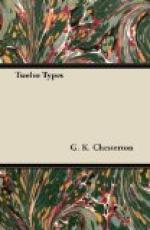This is the real meaning of that mystery which appears so prominently in the lives of great sceptics, which appears with especial prominence in the life of Charles II. I mean their constant oscillation between atheism and Roman Catholicism. Roman Catholicism is indeed a great and fixed and formidable system, but so is atheism. Atheism is indeed the most daring of all dogmas, more daring than the vision of a palpable day of judgment. For it is the assertion of a universal negative; for a man to say that there is no God in the universe is like saying that there are no insects in any of the stars.
Thus it was with that wholesome and systematic sceptic, Charles II. When he took the Sacrament according to the forms of the Roman Church in his last hour he was acting consistently as a philosopher. The wafer might not be God; similarly it might not be a wafer. To the genuine and poetical sceptic the whole world is incredible, with its bulbous mountains and its fantastic trees. The whole order of things is as outrageous as any miracle which could presume to violate it. Transubstantiation might be a dream, but if it was, it was assuredly a dream within a dream. Charles II. sought to guard himself against hell fire because he could not think hell itself more fantastic than the world as it was revealed by science. The priest crept up the staircase, the doors were closed, the few of the faithful who were present hushed themselves respectfully, and so, with every circumstance of secrecy and sanctity, with the cross uplifted and the prayers poured out, was consummated the last great act of logical unbelief.
The problem of Charles II. consists in this, that he has scarcely a moral virtue to his name, and yet he attracts us morally. We feel that some of the virtues have been dropped out in the lists made by all the saints and sages, and that Charles II. was pre-eminently successful in these wild and unmentionable virtues. The real truth of this matter and the real relation of Charles II. to the moral ideal is worth somewhat more exhaustive study.
It is a commonplace that the Restoration movement can only be understood when considered as a reaction against Puritanism. But it is insufficiently realised that the tyranny which half frustrated all the good work of Puritanism was of a very peculiar kind. It was not the fire of Puritanism, the exultation in sobriety, the frenzy of a restraint, which passed away; that still burns in the heart of England, only to be quenched by the final overwhelming sea. But it is seldom remembered that the Puritans were in their day emphatically intellectual bullies, that they relied swaggeringly on the logical necessity of Calvinism, that they bound omnipotence itself in the chains of syllogism. The Puritans fell, through the damning fact that they had a complete theory of life, through the eternal paradox that a satisfactory explanation can never satisfy. Like Brutus and the logical Romans, like the logical French Jacobins,




